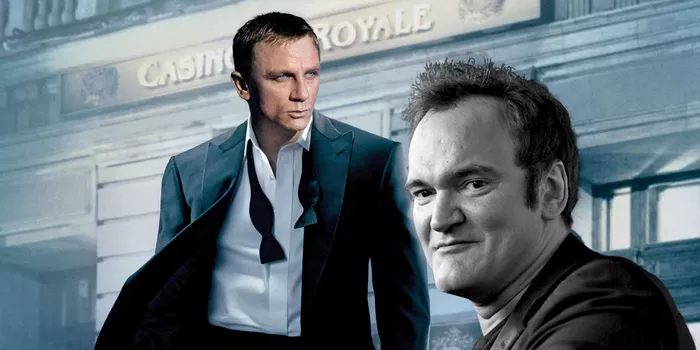Exploring the Director’s Vision and the Impact It Could Have Had
When one thinks of James Bond, the image that often comes to mind is a suave, tuxedo-clad spy with a penchant for martinis and high-stakes espionage. However, what if the iconic filmmaker Quentin Tarantino had taken the reins of the James Bond franchise and directed “Casino Royale” as his follow-up to the groundbreaking “Pulp Fiction”? While the prospect of a Tarantino-helmed Bond film is tantalizing, it’s worth considering how such a departure from the established Bond formula could have been both refreshing and potentially detrimental to the character’s legacy.
Tarantino’s Vision: A Departure from the Norm
Quentin Tarantino’s approach to filmmaking is anything but conventional, marked by his distinctive style, nonlinear narratives, and penchant for dialogue-driven storytelling. Had he directed “Casino Royale” in the late ’90s, as he expressed interest in doing, it would have been a bold departure from the established Bond formula.
Tarantino’s vision for “Casino Royale” would have transported Bond back to the 1960s, a period marked by the height of the Cold War. In doing so, he would have embraced the retro spy thriller elements of the era, paying homage to classic espionage films while infusing his unique sensibilities. The result could have been a Bond film like no other—a stylish and suspenseful entry that harkened back to the franchise’s roots while injecting it with Tarantino’s trademark panache.
A Standalone Bond Movie: Breaking the Mold
One of the most intriguing aspects of Tarantino’s proposed “Casino Royale” is that it would have existed as a standalone Bond movie. Unlike the more recent Bond films, which have been characterized by an overarching narrative and character development, Tarantino’s version would have been a self-contained story.
This departure from the norm could have offered a refreshing take on Bond, allowing audiences to enjoy a Bond film without the weight of continuity and the burden of character progression. It would have been a bold experiment, inviting viewers to appreciate Bond as a character in isolation, rather than as part of a grander narrative.
The Potential Downside: Ruining Daniel Craig’s Bond
While the prospect of a Tarantino-directed Bond film is undoubtedly enticing, it’s essential to consider the potential downsides. In hindsight, it becomes evident that such a departure from the established Bond formula could have had dire consequences for the character’s legacy, particularly in the context of Daniel Craig’s portrayal of Bond.
Craig’s tenure as Bond introduced a level of continuity and character development that the franchise had not seen before. His films, starting with “Casino Royale” (2006), crafted a compelling and layered narrative that explored Bond’s origins, relationships, and personal growth. This approach allowed for a deeper and more nuanced portrayal of the character, elevating Bond from a mere action hero to a complex and relatable figure.
Had Tarantino directed “Casino Royale” in the late ’90s, it would not have accommodated the overarching narrative and character development that defined Craig’s Bond series. The standalone nature of Tarantino’s vision would have been incongruent with the more recent films, potentially undermining the rich character arc that Craig’s Bond experienced.
A Missed Opportunity with a Silver Lining
In the end, while Quentin Tarantino’s version of “Casino Royale” would have undoubtedly been a captivating and stylistically unique addition to the Bond canon, it’s safe to say that it’s a missed opportunity for the franchise. The decision to adhere to the established Bond formula with Daniel Craig’s tenure allowed for a deeper exploration of the character and a more coherent narrative.
In the world of cinema, what-ifs and missed opportunities are par for the course, and Tarantino’s “Casino Royale” remains one of those tantalizing “what could have been” scenarios. While it’s intriguing to imagine Tarantino’s take on Bond, it’s equally important to appreciate the direction the franchise ultimately took, resulting in some of the most memorable and character-driven Bond films to date.

